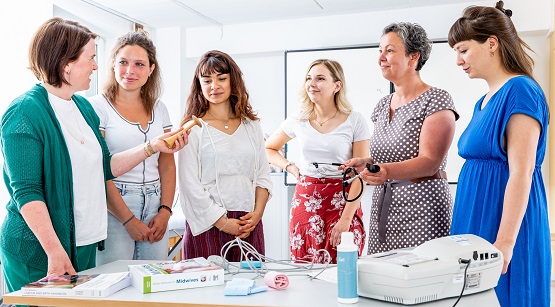
Nursing (B.Sc.)
The Bachelor's degree programme in Nursing combines a professional qualification as a nursing specialist with a first academic degree (Bachelor of Science).
Teaching and study are intended to provide students with knowledge, skills and methods in such a way that they can independently and scientifically practise nursing care for people of all ages. This includes in particular:
- the competences of scientific work, critical thinking and independent action based on ethical standards;
- the examination of the development of theories and models of nursing and its related sciences as well as their significance for all fields of nursing activity;
- development and implementation of evidence-based nursing concepts;
- the critical reflection of nursing activities;
- the conception, planning, implementation and evaluation of own research projects;
- the ability to work in interdisciplinary teams to develop innovative solutions for the various fields of nursing activity and in the context of health promotion;
- to actively participate in the process of professionalising nursing.
The Bachelor's degree programme is a primary qualification programme, i.e. theoretical and practical qualification is provided by the university. In addition to the classical theoretical courses and practical training, the study programme also includes skills training and simulations in the SkillsLab. The programme comprises a total of eight semesters, has a modular structure and is divided into four thematic years of study with the following focus:
1st year of study: Orientation and physiological development in the phases of life
2nd year: Health promotion and prevention in the phases of life
3rd year of study: crises and existential situations in development
4th year of study: professional and scientific role action
In the first year of study, basic knowledge and basic skills of nursing are taught. From the second year of study, the first practical module is completed. A total of 23 compulsory modules, two elective modules and five practical modules must be completed for the degree programme; 30 ETCS are awarded per semester. The practical assignments take place at cooperating clinics, inpatient nursing homes and outpatient nursing services of the Department of Health and Nursing.




